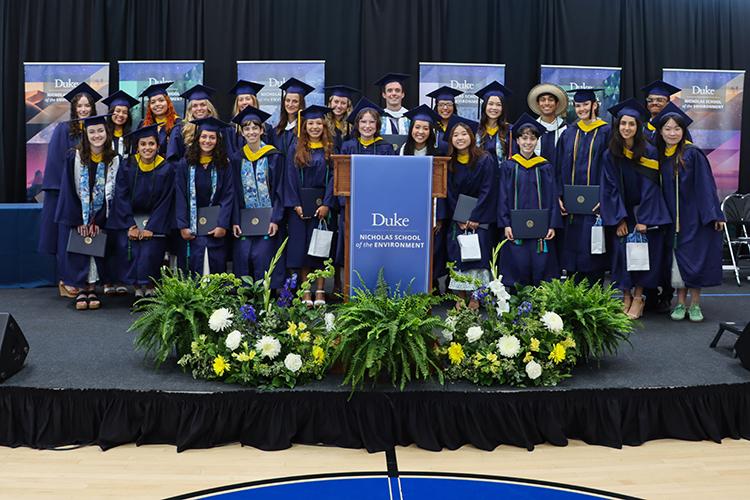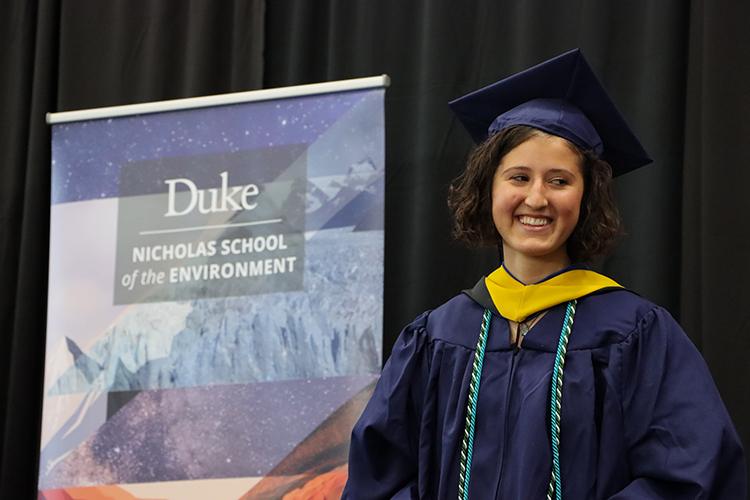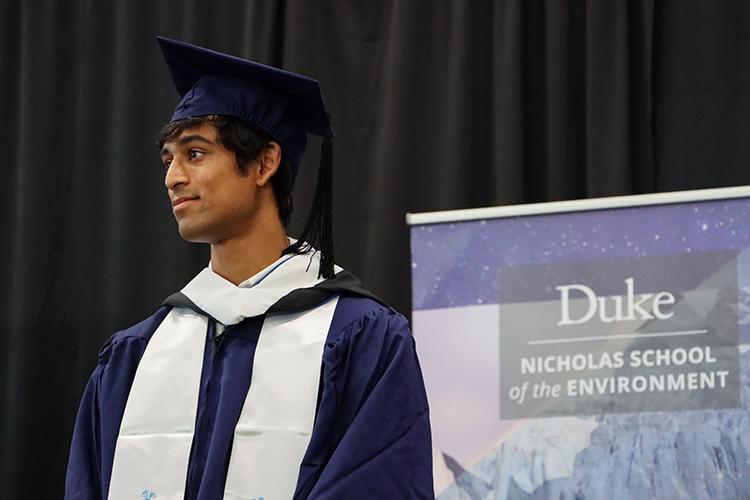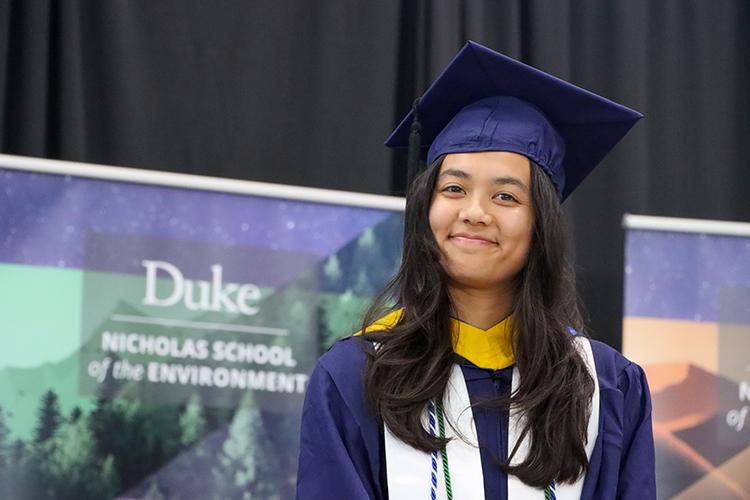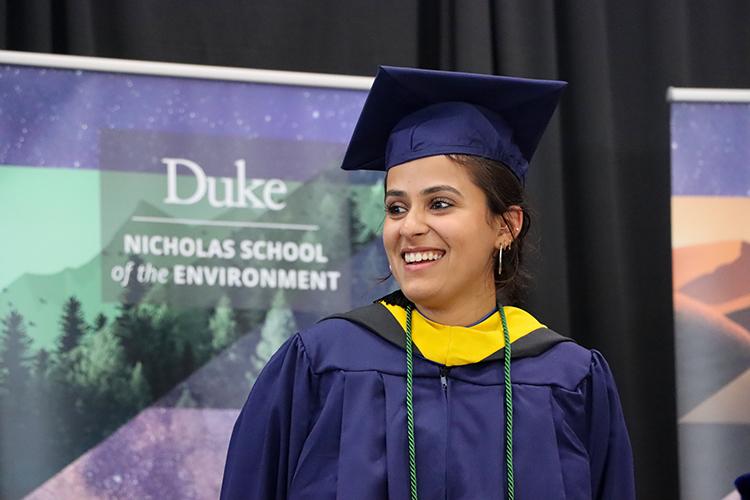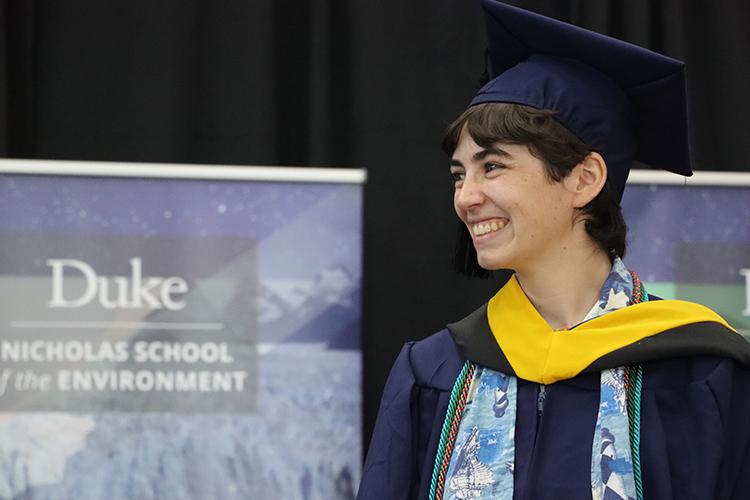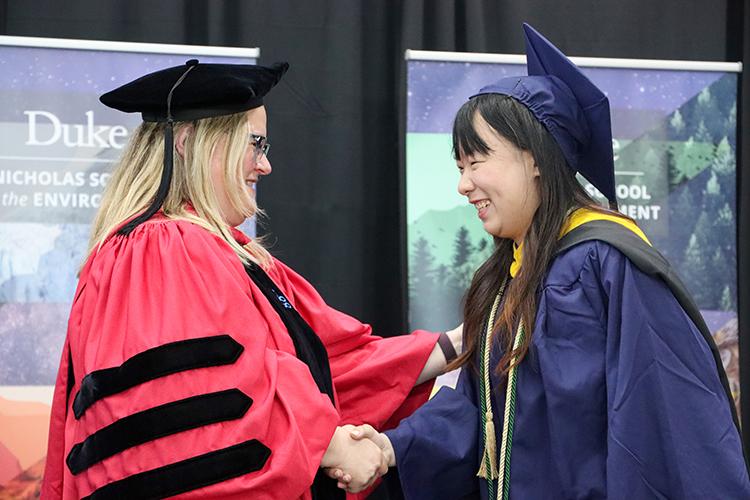Nicholas School Communications & Marketing
DURHAM, N.C. – Duke University’s Nicholas School of the Environment, including the Duke Marine Lab, recognized 32 undergraduate students at a Recognition and Diploma Ceremony on May 11, 2024 for academic excellence and leadership.
A total of 26 undergraduates, including one who graduated in fall 2023, earned the status of Graduation with Distinction. The program recognizes undergraduates who have demonstrated academic excellence through successfully completing a senior thesis based on a substantive independent research project, evaluated by three faculty members. The projects typically include a 25-to 50-page written manuscript and a poster summarizing findings. To earn the distinction, students must also earn a 3.0 grade point average overall and a 3.2 grade point average in their major. The Nicholas School’s undergraduate program offers bachelor of science (BS) and bachelor of arts (AB) degrees in Earth and Climate Sciences; Marine Science & Conservation; and Environmental Sciences & Policy.
Listed in alphabetical order, this year’s recipients of Graduation with Distinction honors, along with their project titles and the names of their faculty advisors, are:
- Zoe Ali: An assessment of the current state of procedural equity in marine protected area projects: advancing the presence of equity in decision-making, supervised by David Gill
- Betty Alfaro-Argueta: Assessment of Atlantic bottlenose dolphin response to oxygen deprivation, supervised by Tom Schultz
- Chloe Beuttel: Exploratory breath analysis using acoustic signal processing of bottlenose dolphins (Tursiops truncatus) in Barataria Bay, Louisiana, supervised by Doug Nowacek
- Erika Berlik: Coexisting foundation species shape reef fish community and trophic structure at an ecotone, supervised by Brian Silliman
- Nicole Bolton: Impacts of mul-1 gene expression on indicators of oxidative damage in C.Elegans, supervised by Joel Meyer
- Thanh-Nhu Bui: All hands on deck: the effects of biological partnership on turtlegrass (Thalassia testudinum) restoration success, supervised by Brian Silliman
- Christian Campbell: Population genetic structure of three distinct bottlenose dolphin (Tursiops truncatus) populations off North Carolina’s coast, supervised by Tom Schultz
- Danny Collins: CRISPR-based biosensors for the rapid detection of ocean life: from diatoms to dolphins, supervised by Meagan Dunphy-Daly
- Ariella Chukwuma: Fish fries & fishing for food: cultural traditions among African Americans on the Southeastern coast of North Carolina, supervised by Grant Murray
- Rosa Golchin: Bringing the heat: a feasibility study on aquifer thermal energy storage in Durham, N.C., supervised by Brian McAdoo
- Anya Gupta: Hydration melting in olivine-bearing zone I of the Stillwater Complex, Montana, supervised by Allen Boudreau (Fall 2023 graduate)
- Rishab Jagatai: Achieving just transitions through prior consultation: examining the successes and failures of consulta previa for wind energy development in La Guajira, Colombia, supervised by Miguel Rojas-Sotelo
- Julia Kagiliery: Evaluating the thermal response across phylogenetic ranks of marine microbial communities from a temperate coastal ocean site, supervised by Zackary Johnson
- Euwan Kim: Empirical correlation analysis for hydrogeologic monitoring in the High Plains aquifer, supervised by Avner Vengosh
- Natalie Lewis: The Effects of perfluorooctanoic acid (PFOA) exposure on reactive oxygen species generation in HepG2 liver cells, supervised by Jason Somarelli and Tom Schultz
- Catalina Lopez: Temporal variation in the standard metabolic rate of juvenile Atlantic killifish (Fundulus heteroclitus), supervised by Nishad Jayasundara
- Emily Nagamoto: Estimating the impact of climate change mitigation pathways on premature mortality from non-optimal temperature and air pollution exposure, supervised by Drew Shindell
- Ali Pagliery: Reducing the severity of whale entanglements: the potential of absorbable sutures in fishing ropes, supervised by Andy Read
- Talya von Planta Newman: The Energy Transition Accelerator as a vehicle for providing low-carbon development capital: opportunities, challenges and uncertainties, supervised by Jackson Ewing
- Olivia Polemeni: Reef distribution and niche partitioning of deep-sea coral ecosystems In the Gulf of Mexico, supervised by Brian Silliman
- Lali Ramirez: Snails & smells: Littoraria irrorate are more likely to ingest polystyrene leachate when combined with positively associated environmental scents, supervised by Dan Rittschof
- Jilly Senk: Sediment accumulation of microplastic particles under an oyster aquafarm, supervised by Tom Schultz
- Kate Silver: Molecular mechanisms of toxicity of GenX and PFOA in C. elegans, supervised by Tess Leuthner and Ryan Baugh
- Kaley Sperling: Investigating variations in eastern mosquitofish (Gambusia holbrooki) oxygen consumption rates across urban streams in Durham, NC with varying stormwater runoff inputs, supervised by Emily Bernhardt
- Annie Wollmuth: Optimizing microgrid performance with energy storage integration: a tool for sustainable grid design, supervised by Luana Lima
- Finnie Zhao: A just pathway toward resilience: building local communities’ adaptive capacity through state-level funding program – a case study of North Carolina, supervised by Betsy Albright and Liz DeMattia
The following students won departmental awards from each of the Nicholas School’s three undergraduate divisions, and Duke’s Trinity College of Arts and Sciences’ Department of Biology.
Rishab Jagetia and Abigail Saks, both in Environmental Sciences & Policy, received the annual Sara Laboskey Award in recognition of their personal integrity and academic excellence. Jagetia has spent recent years working in climate activism, environmental justice work, and researching how energy transitions affect rural populations. His undergraduate thesis researched the limitations of prior consultation policy in engaging rural, indigenous populations in Colombia around renewable energy infrastructure development. After graduating, he plans to travel to Colombia through Duke’s Hart Fellowship to research how communities are participating in a just energy transition. Saks, a Rachel Carson Scholar, is graduating with a double major in biology and Environmental Science & Policy, and plans to pursue a career in climate action and sustainability. Rachel Carson Scholars are trained through small seminar experiences, experiential learning, faculty-student mentorship, and professional development. They design and carry out their own independent research.
Emily Nagamoto and Anya Gupta received the Thomas V. Laska Award, which is presented annually in recognition of outstanding achievement by a graduating senior majoring in Earth & Climate Sciences.
Nagamoto double majored in Earth & Climate Science and Computer Science, and also earned a minor in Environmental Science & Policy. For the past three years, she has worked in Drew Shindell’s lab researching health co-benefits from climate change mitigation. As a participant in Duke’s UN Climate Change Negotiations practicum course, she represented Duke at COP28, or Conference of the Parties, in 2023 in Dubai. Nagamoto plans to continue her climate change impact research.
Gupta, an Earth & Climate Sciences and Environmental Sciences double major, also earned a minor in Hindi. She completed independent research with Alan Boudreau involving hydration melting in Montana's Sillwater Complex, which has the highest reserves of platinum and palladium in the world. Gupta plans to be a park ranger in Yosemite National Park, followed by work in geotechnical consulting once park service season has concluded.
Danny Collins received the Marine Science & Conservation Award, which is presented annually by Duke Marine Lab faculty to a graduating senior in recognition of excellence in scholarship, research and citizenship. Also awarded the Knight-Hennessy Scholarship for graduate study at Stanford University, he will pursue a Ph.D. in oceans there. Collins graduates from the Nicholas School with a double major in Marine Sciences & Conservation, and biology, along with a minor in visual and media studies. His research on marine and synthetic biology led to journal articles, conference presentations, and pending patents. Collins was a national finalist for the Collegiate Inventors Competition and a People’s Choice Award recipient for his work on NucleoTide, an ocean health monitoring system.
Catalina Lopez won the Maggie Schneider Award in Marine Biology, awarded by Duke’s Trinity College of Arts and Sciences’ Department of Biology, for demonstrating a love of learning and service in marine conservation biology. Lopez is a double major in Marine Science & Conservation, and biology. As a Rachel Carson Scholar and a Bonaventura Fellow, they spent a year at the Duke Marine Lab studying seasonal variation in estuarine fish physiology with Nishad Jayasundara, to better understand projected impacts of climate change on marine species. After graduation, they plan to work in fisheries management.
Zixin (Finnie) Zhao won the Forever Duke Student Leadership Award, which honors graduating students across Duke's undergraduate, graduate and professional schools who have exhibited extraordinary leadership during their time at Duke. Zhao pursued a double major in Economics and Environmental Sciences & Policy, with a certificate in Sustainability Engagement. The certificate program for undergraduates confronts the interconnections between environmental, economic and social aspects of sustainability. “I feel super fortunate to be in the Nicholas School community where we are inspired everyday by the amazing work everyone has been doing to make the world better,” Zhao wrote.
###

